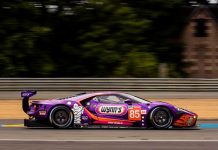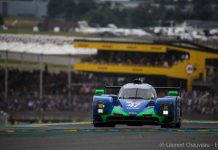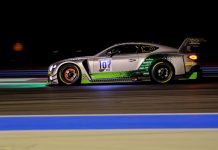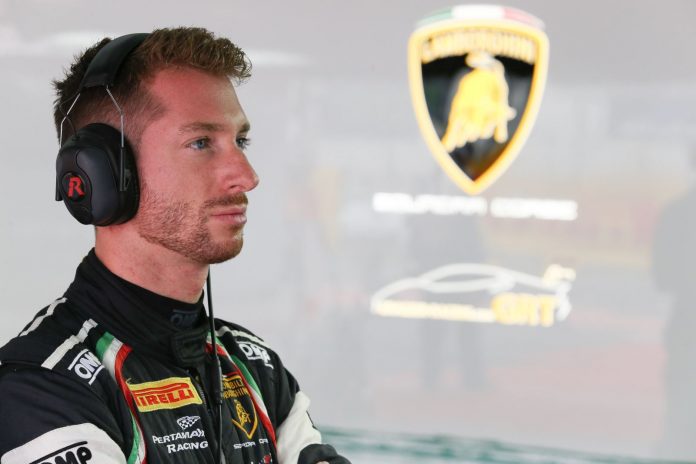A quick glance at the Italian’s track record confirms that he means business. Bortolotti has tasted success in almost everything he has ever raced, with several major championships to show for his efforts.
The Lamborghini factory driver is on a particular high at the moment. Last year he clinched the overall Blancpain GT Series title, sharing the #63 Grasser Racing car with Christian Engelhart, and the duo added the Endurance Cup crown alongside Andrea Caldarelli.
This weekend the title-winning trio will reunite for the opening round of the 2018 Endurance Cup at Monza. They won the three-hour race 12 months ago and used the victory as a launch-pad for their title-winning campaign.
For Bortolotti, winning has become second nature. But it is not only what drives him to compete; at times, winning has been the only guaranteed way of continuing his career in the sport.
ITALY, AUSTRIA, AND A LITTLE BIT OF FINLAND
Bortolotti caught the racing bug at an early age. He remembers attending the Bologna Motor Show, just four years old, and being captivated by the experience.
“I had a chance to see the cars, to touch them, and that was the beginning for me,” he explains.
He is not from a family of racers, though it was his father who “came up with the crazy idea” to buy young Mirko his first go-kart. What began as a hobby quickly developed into an all-consuming passion.
He had the ideal inspiration. Bortolotti grew up watching the great Formula 1 battles between the Ferrari of Michael Schumacher and McLaren’s Mika Hakkinen. Unlikely as it may seem, Mirko was not cheering for the red car.
“I was an Italian kid and my father was supporting Ferrari, but I really liked Mika and the way he behaved, his coolness and how he raced on-track,” says Bortolotti.
His character was partly shaped by a childhood move to Vienna, where Mirko grew up and still lives today.
“But I’ve never really been away from Italy,” he adds. “When I was a kid my family used to travel back quite often, which allowed me to learn about different cultures, other languages, and different people. That was really positive for me. I was not just based in one place and I had lots of different experiences early in my life.”
In fact, you could call this the ideal education for a career in the paddock.
SUCCESS BREEDS SUCCESS
When it came time to move into single-seaters, Bortolotti relied on his talent to climb the ladder. First the Italian motor racing federation helped him into Formula Azzura (now Italian F4).
“They gave me a scholarship and in my first year I finished second,” he explains. “That gave me a chance to step up to Italian Formula 3 with another scholarship and I finished as best rookie, which gave me a chance to stay another year.”
Knowing that only winning would be enough, he grabbed this opportunity with both hands and clinched the 2008 title, which led to a test with the Ferrari Formula 1 squad at their Fiorano circuit.
“I felt incredibly comfortable; it was really good,” recalls Bortolotti, who set an unofficial track record for the car he was driving. “It really changed my career, because the next day Red Bull called and I signed for their young driver programme.”
He spent a year with the Austrian firm, competing in the maiden season of FIA Formula Two, where a respectable fourth in the standings could have been runner-up were it not for an engine failure in the season-ending race.
From Red Bull he switched to Ferrari’s young driver squad and moved to the GP3 Series. This relationship also lasted for just one year, but Mirko speaks with enthusiasm about his experiences with these programmes.
“Both experiences gave me a chance to really grow up as a driver,” he says. “I was working with some of the best people in motorsport and gave me the chance to learn how a driver has to prepare, to behave, and the work that is required if you want to be successful in the long term.”
In 2011 Bortolotti returned to F2 and put everything he had learned over the previous years to good use. Seven wins from 14 races and a total of 12 podiums saw him crowned champion in dominant fashion.
A test with Williams, the prize for winning the F2 title, gave Bortolotti a third Formula 1 outing. But, though he was still just 21 at the time, the Italian had already come to realise that a change of direction was needed.
SEARCHING FOR A ROOF
Despite his success in single-seaters, there was no realistic opportunity for Bortolotti to climb the next step on the ladder. This chapter of his career was closed.
“At that age, it’s not easy to be stable enough mentally to start all over from zero,” says Bortolotti. “That’s the thing I’m most proud of.”
It was a calculated, analytical decision – the kind you suspect Hakkinen would be proud of.
And it paid off. After occasional outings in 2012 he returned to full-time competition in 2013 in the one-make Eurocup Megane Trophy.
Once again, winning was the only option. Bortolotti was new to racing with a roof over his head, but showed his class by comfortably taking the title.
“The thinking behind this move was to gain experience of closed-cockpit car, because the driving is completely different to a formula car,” he explains.
As Bortolotti points out, he was not the first to walk this path: Maxime Martin and Albert Costa had both used the same series to launch their GT careers.
It worked particularly well for Bortolotti. Having only committed to a new direction in 2013, he signed with Lamborghini the following year.
“The timing was perfect,” says Bortolotti. “Lamborghini was working on the new Huracan GT3 project in 2014 and the whole thing started to grow from there.
“When I heard the plans they had for the future and the expectations they had set, it was clear that it would suit me. When I took the decision to leave single-seaters I knew that I wanted to be in a certain type of situation, otherwise continuing in motorsport would not have made sense.
“So it was great timing, and a great opportunity for me to start a new project with Lambo.”
GUNNING FOR MORE MONZA GLORY
Today, Bortolotti is established as a key player in Lamborghini’s GT racing effort. Being part of the project from the start is something that he takes particular pride in.
“If you want to compete in GT3 racing on the level we do in the Blancpain GT Series, you can’t expect to arrive and be successful from day one. The level is just so high.
“For me, this is what’s really special: we weren’t a winning team at the beginning, we became a winning team through hard work.”
That work culminated in 2017. After winning at Monza, the #63 Grasser-Lamborghini won three further races in succession, laying the foundations for the overall title.
“We were consistent and quick right from the beginning,” says Bortolotti. “We did a great job on preparing the car, on setups and on pit stops. It’s a lot more work than you might expect.”
This effort has allowed Bortolotti and Lamborghini to return home as champions. Though he knows the points on offer are the same as at other races, he is relishing the weekend ahead.
“As an Italian, it’s always special to race at Monza. It’s an importance event, especially from an emotional point of view. It’s always cool to see the fans and your friends supporting you at the race.”
By winning the opening Sprint contest of the season at Zolder, Bortolotti and Engelhart made it clear that their #63 Grasser-Lamborghini will be among the title protagonists once more this season.
With such competitive rivals it won’t be easy to go back-to-back. But, as he says himself, fighting for championships is what Bortolotti is here to do.









